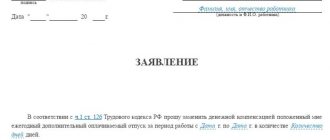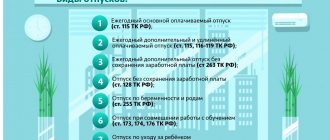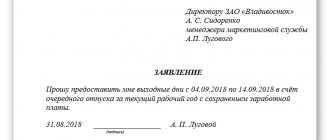Duration of vacation: understanding the terminology
According to Art.
120 of the Labor Code of the Russian Federation, annual basic paid leave is provided in calendar days, therefore, it does not matter what day according to the calendar and schedule the vacation time falls on. Its minimum duration is 28 calendar days (Article 115 of the Labor Code of the Russian Federation). But there are employees who are entitled to extended leave: disabled people, civil servants, teaching staff, minors, etc. The duration of leave does not include only non-working holidays, which are defined in Art. 112 Labor Code of the Russian Federation. So, for example, if an employee takes vacation from June 1 to June 28, then he needs to leave the vacation not on June 29, but on June 30, since the vacation days include a non-working holiday - June 12. In this case, the order to grant leave to the employee is completed simply: in the line “Annual paid leave” 28 calendar days are indicated, and in the period “from ... to” the dates from June 1 to June 29 are written.
Rescheduled weekends, which are included in the vacation duration, should not be confused with non-working holidays. Please note how the transfer of holidays in 2020 is established.
Calculation of vacation days
The right to leave under the Labor Code arises after six months of continuous work in a particular company. That is, the vacation period begins to form at the time of employment. Therefore, it is important to know the date of signing the contract.
When calculating vacation days, the total number of days of rest due to a citizen is taken into account. If we are talking about a standard duration of twenty-eight days, then 2.3 days of rest are accrued from each month. For a longer period, for example, due to difficult working conditions, the total number of days is divided into twelve months.
After determining the number of days within one month, the sum of the periods worked is calculated. If a person worked up to fifteen days in a month, then he is not counted, but if more than sixteen, then he is counted as a whole.
This is important to know: Tax deduction for the construction of a residential building
Vacation experience: what is included in it?
All rules for determining length of service giving the right to annual paid leave are laid down in Art. 121 Labor Code of the Russian Federation. And here it is important to pay attention to the fact that it includes not only the time of actual work, but also periods when the employee did not actually work, but retained his place of work (position).
Also in Art. 121 of the Labor Code of the Russian Federation specifies the time of unpaid leave provided at the request of an employee, not exceeding 14 calendar days during the working year. This rule means that 14 days are always included in the length of service giving the right to annual paid leave, and anything that exceeds these 14 days delays the end of the working year. This is also stated in the Letter of Rostrud dated June 14, 2012 No. 854-6-1.
In addition to the above-mentioned cases, the length of service that gives the right to annual basic paid leave includes: time of forced absence in the event of illegal dismissal or suspension from work and subsequent reinstatement to the previous job; the period of suspension from work of an employee who did not undergo a mandatory medical examination through no fault of his own, and other periods. This topic is discussed in more detail in the article Vacation experience: how to determine in various situations.
Leave without pay
Leave without pay comes in different forms. There are those that are provided upon a written application from the employee with the consent of the employer. And there are either categories of employees or certain life situations when, at the written request of the employee, the employer is obliged to provide a certain number of days of vacation without pay. These norms are reflected in Art. 128 Labor Code of the Russian Federation.
For family reasons and other valid reasons, an employee, upon his written application, may be (that is, in this situation, the employer has the full right to refuse) granted leave without pay, the duration of which is determined by agreement between the employee and the employer.
At the same time, the employer is obliged, based on a written application from the employee, to provide leave without pay:
- participants of the Great Patriotic War - up to 35 calendar days per year;
- for working old-age pensioners (by age) - up to 14 calendar days per year;
- parents and wives (husbands) of military personnel, employees of internal affairs bodies, the federal fire service, etc. - up to 14 calendar days a year;
- for working disabled people - up to 60 calendar days per year;
- employees in cases of the birth of a child, marriage registration, death of close relatives - up to 5 calendar days. Please note that the period during which an employee can exercise his right to write an application for such leave is not defined. The facts themselves matter. Therefore, when submitting unpaid leave in this case, the employer must check the occurrence of events: for example, was the birth of a child a legal fact and did the employee write a written statement?
Questions often arise about how to determine the working year for part-time workers. In this case, you need to focus on Art. 121 of the Labor Code, it states that the length of service giving the right to leave includes not only the time of actual work, but also the time when the employee did not actually work, but the work time was retained for him. In addition, Art. 93 of the Labor Code of the Russian Federation indicates that part-time work does not entail for employees any restrictions on the duration of the annual basic paid leave, calculation of length of service and other labor rights?
Calculate vacation pay automatically and without errors
To learn more
Another common question when applying for vacation pay: is it worth including in the length of service that gives the right to annual leave the period when the employee was on parental leave, but at the same time working part-time? Working part-time while on parental leave entitles the employee to leave. But there is one caveat: you cannot provide parental leave and annual basic paid leave at the same time. And this norm is reflected in the Resolution of the Plenum of the Armed Forces of the Russian Federation dated January 28, 2014 No. 1.
Therefore, if a part-time employee during parental leave expresses a desire to go on annual basic paid leave, the employer needs to do the following:
- take from the employee an application to interrupt parental leave (and if the child is under 1.5 years old, then also an application to terminate the payment of child care benefits before reaching the age of 1.5 years);
- issue an order (in any form) to interrupt parental leave and terminate the provision of benefits;
- accept the employee’s application for annual basic paid leave;
- issue a leave order;
- after the vacation, take the employee’s application again with a request to provide parental leave until the child reaches the age of 3 years.
Financial compensation
An employee can receive monetary compensation for unused vacation for the current year in the year of dismissal.
An employee may replace with monetary compensation a part of the main vacation exceeding thirty calendar days.
This does not apply to “northerners”; for them, replacing vacation and its parts with monetary compensation is not allowed. except in the event of his dismissal from service in the federal fire service.
Full information on monetary compensation for employees is described in Order of the Ministry of Emergency Situations of Russia 271 dated June 29, 2017 “On approval of the Procedure for replacing part of the main leave of an employee of the Federal Border Guard Service of the State Border Service, exceeding thirty calendar days, with monetary compensation,” as well as Art. 57 of the Federal Law of the Russian Federation No. 141-FZ of May 23, 2016 “On service in the Federal Border Guard Service of the State Border Service.”
On this topic ▼
Compensation payments to employees and workers of the Ministry of Emergency Situations
In accordance with the labor legislation of the Russian Federation, female employees of the Federal Fire Service are granted maternity leave.
A female FPS employee, as well as an employee who is a father (adoptive parent, trustee) and raising a child without a mother, is granted parental leave until the child reaches the age of three years in the manner prescribed by labor legislation. Such an employee, to the extent that does not contradict this Federal Law, is subject to social guarantees established by labor legislation.
An employee of the Federal Border Guard Service holding a position related to the implementation of teaching activities is granted basic leave and additional leave for length of service, as a rule, during the vacation period of cadets and students.
What do you need to know about holiday entitlement?
Employers should adhere to the basic rule - paid leave must be provided to the employee annually, because this is required by the Labor Code.
At the same time, in Art. 124 of the Labor Code of the Russian Federation contains the following clause: “In exceptional cases, when the provision of leave to an employee in the current working year may adversely affect the normal course of work of an organization or individual entrepreneur, it is allowed, with the consent of the employee, to transfer the leave to the next working year. In this case, the leave must be used no later than 12 months after the end of the working year for which it is granted.”
The right to use vacation for the first year of work arises for the employee after six months of his continuous work with the employer, although by agreement of the parties it can be granted earlier. Some employers find this definition misleading. They reason like this: the employee can indeed write a statement, but the employer has the right to decide whether he will let him go on vacation or not. From a legal point of view, after six months of work, the employee has every right to write an application for leave for all 28 days, and the employer is obliged to provide him with this leave.
Leave for the second and subsequent years of work can be granted at any time of the working year in accordance with the order of provision of annual paid leave established by the employer.
Travel time to and from your vacation destination
Travel on vacation Ministry of Emergency Situations
Let's figure out in what cases the so-called “days for travel” are given and what they are?
So, this is the number of calendar days that are needed to travel to the vacation destination and back, taking into account the type of transport. The following types of leave are increased by this number of days:
- main leave;
- leave for personal reasons;
- leave upon graduation from an educational organization of higher education of the federal executive body in the field of fire safety;
- leave of ten calendar days or more granted to an employee of the Federal Border Guard Service in the year of entry into service.
How to properly divide your vacation into parts?
In the vacation schedule, employers often indicate parts of the vacation. The norms of ILO Convention No. 132, namely Art. 8 allow this: “The division of annual leave with pay may be authorized by the competent authority or other appropriate authority in each country.”
In Part 1 of Art. 125 of the Labor Code of the Russian Federation states that, by agreement between the employee and the employer, annual paid leave can be divided into parts, and at least one of the parts of this leave must be at least 14 calendar days. Often the employer shows exactly this breakdown in the vacation schedule - 14 days and 14 days. Seeing this, the inspector from the GIT begins to ask questions. The employer has nothing to fear if he has “safety net” in the form of an agreement between the parties. If there are no agreements, then he may be brought to administrative liability under Part 1 of Art. 5.27 Code of Administrative Offences.
The continuous part of the annual paid leave (14 days), which is mentioned in paragraph 2 of Art. 8 of the ILO Convention, is granted and used no later than within one year, and the balance of annual paid leave no later than within 18 months after the end of the year for which the leave is granted.
In Art. 9 of ILO Convention No. 132 specifies that “any part of annual leave in excess of the established minimum duration may be deferred, with the consent of the employee, for a period exceeding that specified in paragraph 1 of this Article, but not exceeding certain separately established limits.”
If the employer violated the law and for some reason the employees were not given vacations for several years, then upon dismissal of these employees, the employer is obliged to pay them compensation for all unused vacations (Article 127 of the Labor Code of the Russian Federation). The concept of “burnt out” does not exist for a vacation.
Letter of Rostrud dated 06/08/2007 No. 1921-6 also recalls the preservation of the right to use all due annual paid leaves: “Annual leaves for previous working periods can be provided either as part of the leave schedule for the next calendar year, or by agreement between the employee and the employer.” .
At the time of inspection, the State Tax Inspectorate usually always requests a vacation schedule, while asking for employees’ personal cards (T-2) selectively. And we need to remember this. If an employer leaves a violation in the form of vacation arrears on his personal card, he can avoid problems, and if he enters the entire debt into the vacation schedule, then he actually voluntarily admits to violations.
Employee recall from vacation
A FPS employee can be recalled from vacation without his consent only if the following circumstances occur:
during the period of martial law or a state of emergency, during a counter-terrorist operation, in conditions of armed conflict, during the elimination of fires, the consequences of accidents, natural and man-made disasters and other emergency situations (Article 35 141-FZ).
Outside of the listed circumstances, recall from leave requires the employee’s consent.
That part of the leave that remains unused must be provided to the FPS employee at a time convenient for him in the current year or during the next year.
If the unused portion of the vacation is ten calendar days or more , the employee is paid the cost of travel to and from the vacation site and is given additional time to travel to and from the vacation site.
the link to report your vacation review.
Transferring vacation legally
The vacation schedule is mandatory for both the employer and the employee (Article 123 of the Labor Code of the Russian Federation). Therefore, both of them must follow it. All cases of transferring vacation are determined by law - in Art. 124 Labor Code of the Russian Federation. These cases include:
- temporary disability of the employee;
- the employee performs state duties during his annual paid leave, if the labor legislation provides for exemption from work for this purpose;
- in other cases provided for by labor legislation and local regulations. For example, in the internal labor regulations in the “Rest time” section, a clause may be included that, upon a written application from the employee, vacation can be postponed to another period with the consent of the employer, but within the calendar year. In this case, the estimated and actual dates will not legally coincide;
- if the employee was not paid in a timely manner for the duration of the annual paid leave or the employee was warned about the start time of this leave later than two weeks before its start, then the employer, upon a written application from the employee, is obliged to postpone the annual paid leave to another date agreed with the employee.
Compensation for unused vacation
In accordance with Art. 126 of the Labor Code of the Russian Federation, part of the annual paid leave exceeding 28 calendar days, upon a written application from the employee, can be replaced by monetary compensation. We are talking about disabled people, minors, pelagic workers and other workers who are entitled to leave of more than 28 days.
As for all other employees, even if they have not taken vacation for several years, they cannot replace these vacations with compensation. In accordance with Art. 127 of the Labor Code of the Russian Federation, compensation is possible only upon dismissal of an employee. This topic is discussed in more detail in the article Vacation compensation: when can vacation be replaced with money?
Other types
If their payment is provided for by the legislation of the Russian Federation
In accordance with Art. 64 FZ-141, a FPS employee is granted, at his request, leave for personal reasons of thirty calendar days.
This leave is granted if you have served in the Federal Border Guard Service for twenty years or more in calendar terms.
The specified leave is granted only once during the entire period of service:
- in any year of the last three years before the employee reaches the age limit;
- after the employee reaches the age limit, provided that he had not previously used the specified leave;
- in the year of dismissal from service due to health conditions or due to a reduction in position in the Federal Border Guard Service.
For all of the above types of leave, monetary allowance is maintained.
Basic principles for calculating vacation pay
Art. 139 of the Labor Code of the Russian Federation states that average earnings are calculated for 12 calendar months preceding the period during which the employee retains the average salary. In this case, a calendar month is considered to be the period from the 1st to the 30th (31st) day of the corresponding month inclusive (in February - to the 28th (29th) day inclusive). Average daily earnings for vacation pay and compensation for unused vacations are calculated for the last 12 calendar months by dividing the amount of accrued wages by 12 and by 29.3 (the average monthly number of calendar days).
Average daily earnings = Actual accrued salary for the billing period: 12: 29.3
Another key document that clarifies this issue is Decree of the Government of the Russian Federation dated December 24, 2007 No. 922. Clause 6 clarifies that if the employee did not have actual accrued wages or actually worked days for the billing period or for a period exceeding the billing period , or this period consisted of time excluded from the calculation period in accordance with paragraph 5 of the Resolution, the average earnings are determined based on the amount of wages actually accrued for the previous period, equal to the calculation period.
Design rules
The procedure for granting vacations throughout the year is determined by the schedule. This is a mandatory document that must be drawn up in every organization. The only exceptions can be so-called micro-enterprises, the number of employees of which is less than 15 people - simplification and reduction of personnel documentation is provided.
The start of the vacation is formalized by order. It is most convenient to use their unified forms T-6 or T-6a (to be provided to several employees at the same time). It is enough to enter all the necessary information into the already formed form. It is important to include information about the employee’s length of service in the order. This is necessary to correctly determine the duration of rest.
Orders also formalize such procedures as recall from vacation, rescheduling of vacation, extension of vacation. Before issuing an order for the early recall of an employee, it is necessary to obtain his consent.
Refusal to interrupt vacation is the employee’s legal right, and not a disciplinary offense. There should be no punishment.
Exiting vacation after the end of the holiday does not require additional registration.










